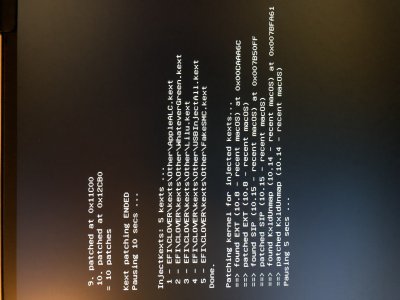I`ve tried to install 3rd Party Kexts into /Library/Extensions through Hackintool on Catalina 10.15.2 as recommended here and received panic:
panic(cpu 6 caller 0xffffff800626520a): Kernel trap at 0xffffff7f8a8c4430, type 14=page fault, registers:
CR0: 0x000000008001003b, CR2: 0x0000000000000000, CR3: 0x000000001d9d7000, CR4: 0x00000000001626e0
RAX: 0xffffff80a8198f00, RBX: 0xffffff873eb4e000, RCX: 0xffffff80a83f2e30, RDX: 0xffffff80a83f2e30
RSP: 0xffffff873eb13b50, RBP: 0xffffff873eb13c80, RSI: 0x0000000000000010, RDI: 0x0000000000000000
R8: 0x0000000000000000, R9: 0x0000000000001000, R10: 0x0000000000000001, R11: 0x0000000000000000
R12: 0xffffff8006c6e1e0, R13: 0xffffff8006c23d10, R14: 0xffffff8006c23150, R15: 0xffffff80a768b000
RFL: 0x0000000000010286, RIP: 0xffffff7f8a8c4430, CS: 0x0000000000000008, SS: 0x0000000000000000
Fault CR2: 0x0000000000000000, Error code: 0x0000000000000000, Fault CPU: 0x6, PL: 0, VF: 1
Backtrace (CPU 6), Frame : Return Address
0xffffff873eb135b0 : 0xffffff800613bb1b mach_kernel : _handle_debugger_trap + 0x47b
0xffffff873eb13600 : 0xffffff80062733e5 mach_kernel : _kdp_i386_trap + 0x155
0xffffff873eb13640 : 0xffffff8006264e5e mach_kernel : _kernel_trap + 0x4ee
0xffffff873eb13690 : 0xffffff80060e2a40 mach_kernel : _return_from_trap + 0xe0
0xffffff873eb136b0 : 0xffffff800613b207 mach_kernel : _DebuggerTrapWithState + 0x17
0xffffff873eb137b0 : 0xffffff800613b5eb mach_kernel : _panic_trap_to_debugger + 0x21b
0xffffff873eb13800 : 0xffffff80068d24f9 mach_kernel : _panic + 0x61
0xffffff873eb13870 : 0xffffff800626520a mach_kernel : _sync_iss_to_iks + 0x2aa
0xffffff873eb139f0 : 0xffffff8006264f08 mach_kernel : _kernel_trap + 0x598
0xffffff873eb13a40 : 0xffffff80060e2a40 mach_kernel : _return_from_trap + 0xe0
0xffffff873eb13a60 : 0xffffff7f8a8c4430 com.apple.driver.AppleAHCIPort : __ZN13AppleAHCIPort14InitializePortEv + 0x21e
0xffffff873eb13c80 : 0xffffff7f8a8c9d92 com.apple.driver.AppleAHCIPort : __ZN27AppleIntelPchSeriesAHCIPort14InitializePortEv + 0x1a
0xffffff873eb13cb0 : 0xffffff7f880b0788 com.apple.iokit.IOAHCIFamily : __ZN10IOAHCIPort5startEP9IOService + 0x3b0
0xffffff873eb13d10 : 0xffffff7f8a8c41f1 com.apple.driver.AppleAHCIPort : __ZN13AppleAHCIPort10AttachPortEP9IOService + 0x29
0xffffff873eb13d30 : 0xffffff7f8a8c3040 com.apple.driver.AppleAHCIPort : __ZN9AppleAHCI20CreateIndividualPortEj + 0x10c
0xffffff873eb13d70 : 0xffffff7f8a8c2b74 com.apple.driver.AppleAHCIPort : __ZN9AppleAHCI11CreatePortsEv + 0x2a
0xffffff873eb13da0 : 0xffffff7f8a8c25c3 com.apple.driver.AppleAHCIPort : __ZN9AppleAHCI5startEP9IOService + 0x53d
0xffffff873eb13de0 : 0xffffff800681ae46 mach_kernel : __ZN9IOService14startCandidateEPS_ + 0xf6
0xffffff873eb13e40 : 0xffffff800681a9f1 mach_kernel : __ZN9IOService15probeCandidatesEP12OSOrderedSet + 0xb21
0xffffff873eb13ef0 : 0xffffff8006819d3e mach_kernel : __ZN9IOService14doServiceMatchEj + 0x2ce
0xffffff873eb13f50 : 0xffffff800681c4dd mach_kernel : __ZN15_IOConfigThread4mainEPvi + 0x15d
0xffffff873eb13fa0 : 0xffffff80060e213e mach_kernel : _call_continuation + 0x2e
Kernel Extensions in backtrace:
com.apple.iokit.IOAHCIFamily(290.0.1)[1348CB77-02A5-333C-BD2D-2E33F6B182FA]@0xffffff7f880af000->0xffffff7f880c9fff
com.apple.driver.AppleAHCIPort(999.1.1)[440D7F9B-DE37-375D-AFE0-EABC372B001E]@0xffffff7f8a8c1000->0xffffff7f8a8dcfff
dependency: com.apple.iokit.IOAHCIFamily(290.0.1)[1348CB77-02A5-333C-BD2D-2E33F6B182FA]@0xffffff7f880af000
dependency: com.apple.iokit.IOPCIFamily(2.9)[1286D5E5-A6A1-3C44-A244-04C068903DB2]@0xffffff7f86ea5000
BSD process name corresponding to current thread: kernel_task
Boot args: -v debug=0x100 keepsyms=1 ngfxcompat=1 npci=0x2000
Mac OS version:
Not yet set
Kernel version:
Darwin Kernel Version 19.2.0: Sat Nov 9 03:47:04 PST 2019; root:xnu-6153.61.1~20/RELEASE_X86_64
Kernel UUID: C3E7E405-C692-356B-88D3-C30041FD1E72
Kernel slide: 0x0000000005e00000
Kernel text base: 0xffffff8006000000
__HIB text base: 0xffffff8005f00000
System model name: MacPro6,1 (Mac-F60DEB81FF30ACF6)
System shutdown begun: NO
Panic diags file unavailable, panic occurred prior to initialization
System uptime in nanoseconds: 5515772318
last loaded kext at 4327123704: >usb.!UXHCIPCI 1.2 (addr 0xffffff7f87420000, size 204800)
last unloaded kext at 1950350530: org.netkas.driver.FakeSMC 1800 (addr 0xffffff7f8a9e0000, size 69632)
loaded kexts:


